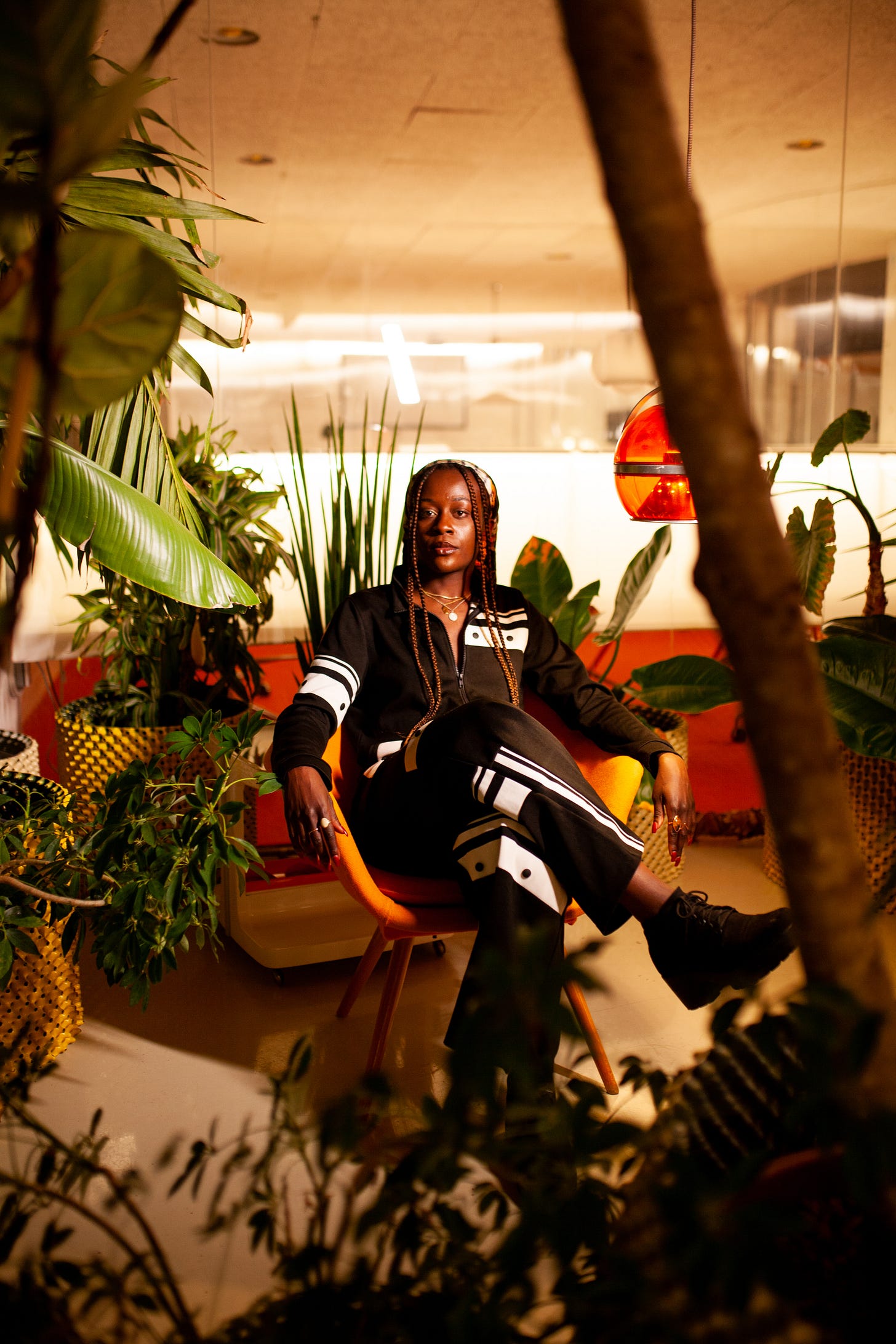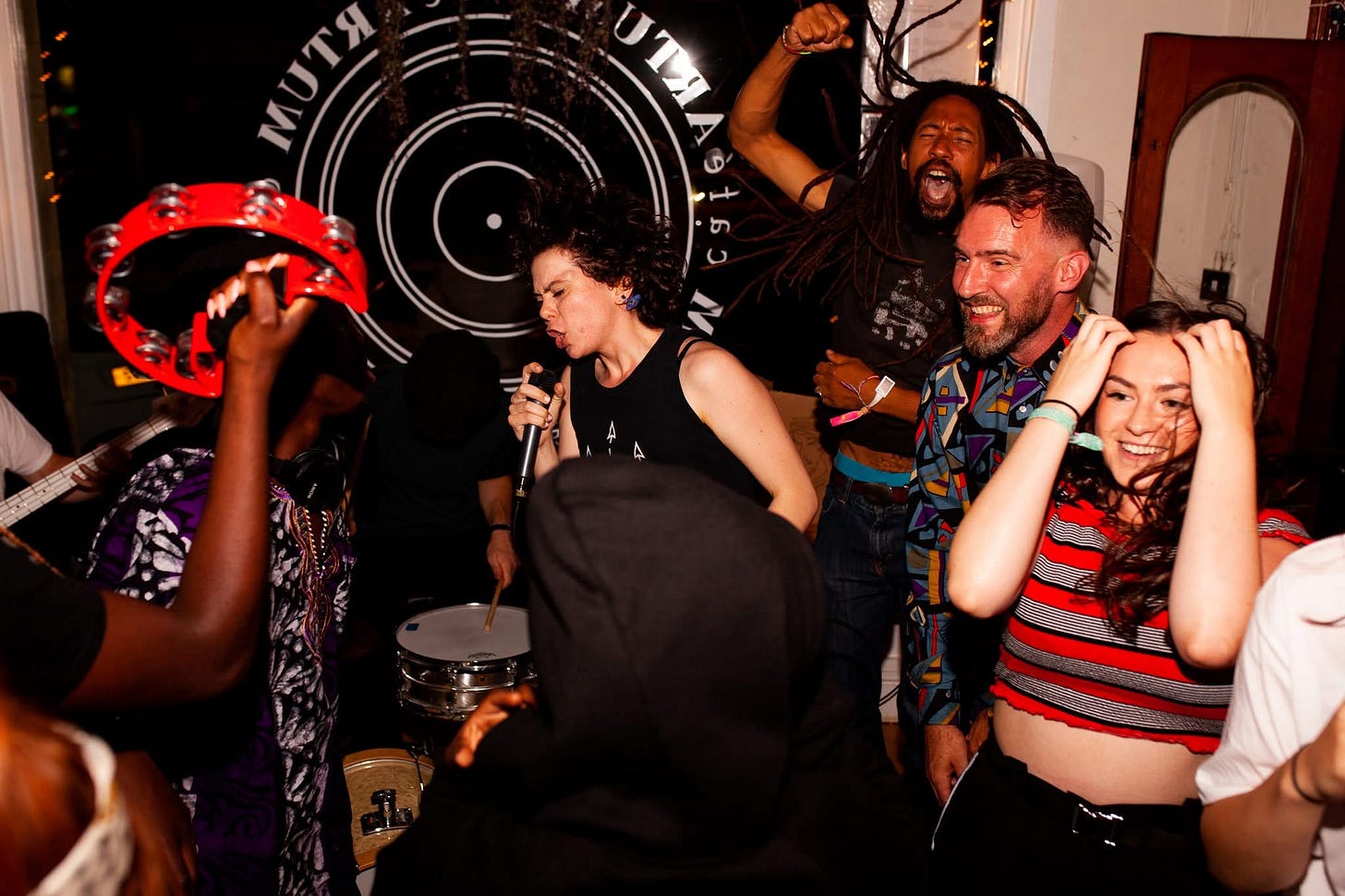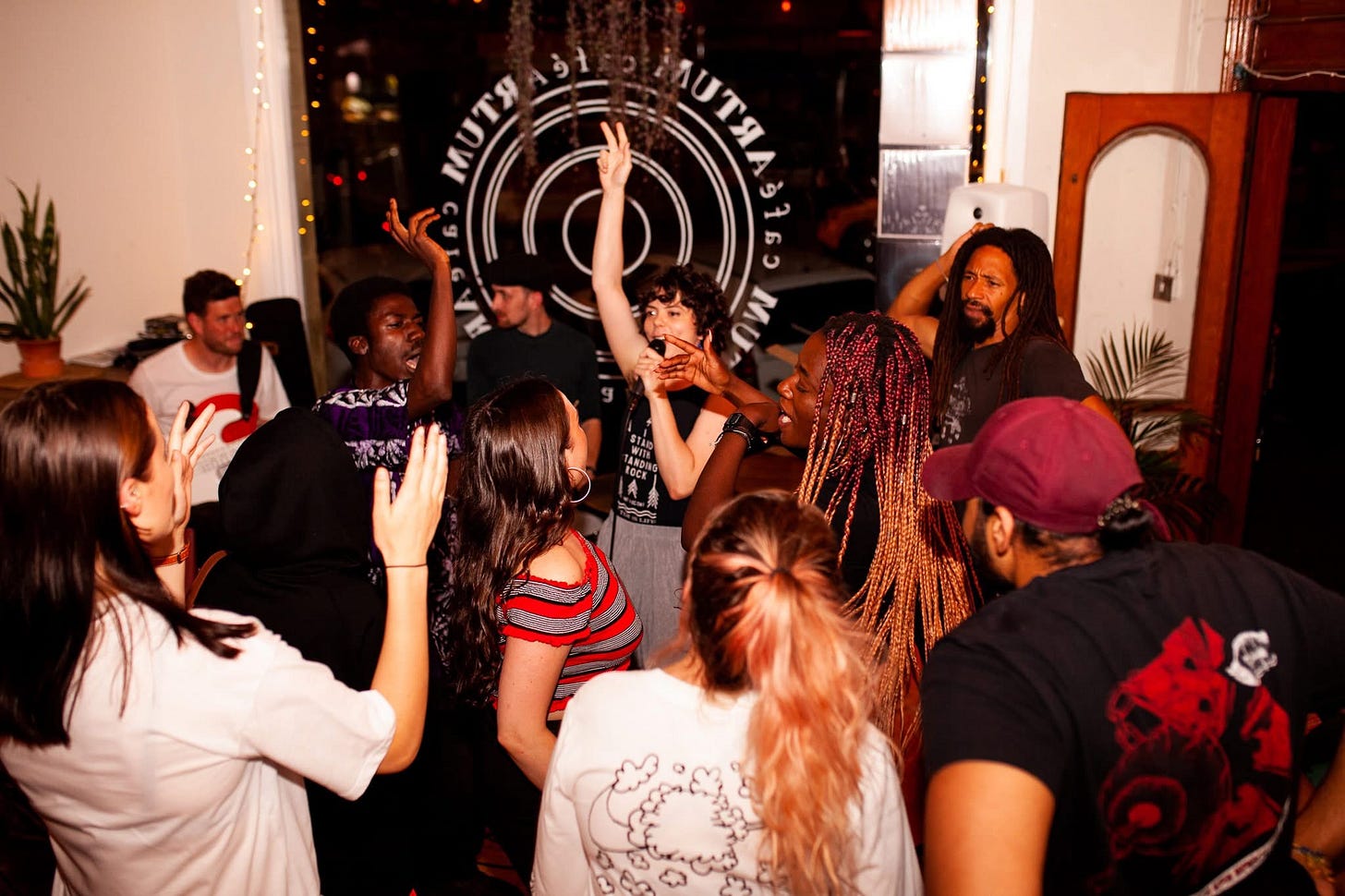Making Noise, Breaking Barriers, and Building Community in Music: An Interview With Joy Warmann
+ some housekeeping
Some quick housekeeping!
- Moved the blog to Substack from Wordpress because, let’s be real, it’s not 2008 anymore.
- This is my industry-leaning blog, where I’ll plug other people’s work + as well as mine! Check out my other work and what I offer over on my website and look out for discounts for DIY acts in the coming months
If you’re enjoying this, consider becoming a paid subscriber so I can keep doing this without working myself into an early grave.
Pass this along to anyone who might find it useful—sharing is caring.
Always down to feature Black professionals and allies with something to say or a project to plug. Hit me up!
For interesting conversations with musicians tap into black radical.
In this edition of The Pact, we speak with Project Manager Joy Warmann, who works at Secretly Group (home to Dead Oceans, Jagjaguar, Secretly Canadian, Ghostly, Saddest Factory, and All Flowers Group). Her roster includes the lush, cinematic indie pop of Japanese Breakfast, the genre-blurring soundscapes of Toro y Moi, the raw, emotionally charged post-punk of Porridge Radio, and the ferocious, boundary-pushing hardcore of Scowl.
I first heard about Joy through my friends at Secretly Group after she stepped into her role as a project manager a few months after I had moved on as publicist there. Though we never shared the same office space, her name was a constant refrain in conversations—always spoken with admiration. My friends raved about her energy, professionalism, and unwavering passion for music. By the time we finally worked together on projects for Claud and Jamila Woods, she more than lived up to the glowing praise.
It was heartening to see more diversity at the company after my departure, a beacon of change in an industry that often feels slow to evolve. In our conversation, she takes us through her winding journey into the music world, the unique joys and struggles of being a Black woman in independent music, and the power of community through her work with Imaginary Millions. We also reflect on why open conversations and persistent action are essential in breaking barriers and carving out space for Black women in these arenas
Michelle Kambasha: So, let’s start with your background—how did you get into the music industry, and what led you to the alternative side of it?
Joy Warmann: It was a slightly convoluted route. I didn’t study music—I actually didn’t even want to go to university, but with African parents, we all know how that conversation goes! So, I went to uni, completed my course, and then decided it was time to figure out how to break into music.
I didn’t have many direct avenues into the industry—I hadn’t studied it, had no contacts—so I had to hustle. I started with music journalism, running a blog, and writing freelance pieces. I also hosted a radio show, which helped me meet people in and around the industry—though all of this was unpaid.
The turning point came when I met Rob Major, the founder of Imaginary Millions, a creative community I now lead in the UK. Rob was running a monthly jam night in London in 2018 and reached out to collaborate. We teamed up and ran those nights together for about four years until COVID shut us down. Through that experience, I built many connections.
When COVID hit, I lost my freelance work. But then, I saw a job opening at Secretly Group, applied, and here I am today.
That’s quite a journey. It sounds like building contacts was key.
Taking it back a bit, when did your passion for music start and how would you describe your experience of Black girlhood through the lens of music?
Music has always been a huge part of my life. I grew up in a musical household—two of my four older brothers are musicians. I was raised on '90s hip-hop, neo-soul, Usher, and Aaliyah. In secondary school, I discovered Paramore, Taking Back Sunday, and fell deep into metal, pop punk, and rock.
The moment I knew I wanted to work in music was at a Paramore show in 2010 at the O2. Hayley said, "Music has always been there for us, and now we get to be there for music." I thought, I want to be there for music. At uni, another epiphany hit me after a Janelle Monáe gig. I came home thinking, What am I doing? I need to make this happen. I literally searched "jobs in music" on Wikipedia and explored every role.
That’s when I landed on A&R—not just because it was at the top of the list! It felt like the perfect fit for my personality. That was it—I knew what I wanted to do.
So, when you started with Imaginary Millions, what drew you to it? Was it the chance to curate nights, interact with musicians, or create a culture and community through music?
For me, everything I’ve done in music has come down to one thing: How can I connect great artists with the resources and support they need to thrive?
That’s what pulled me into Imaginary Millions. The founder, Rob Major, is one of the most selfless people I’ve met—fully dedicated to music and bringing people together.
I loved that Imaginary Millions created a space without barriers—where anyone could jump on the mic, no sign-up sheets or gatekeeping. It was about breaking down the wall between performer and audience and embracing a real, communal vibe.
But I didn’t sign on immediately. I told Rob, "Let me come to a night first, and then we can talk." When I did, there were only about 15 or 20 people in the room—but the energy was electric. People were fully present—listening, sharing, feeling the music. It wasn’t about big names or polished performances. It was about people expressing themselves in the moment and the audience holding space for them. I remember thinking: This could be something special. We could do some really cool sht with this.*
What made you hesitate at first? Were you looking for a certain feeling—like a sense of community? Was that what you wanted to see before committing?
Honestly, I wasn’t looking for anything specific. The relationship with Rob was funny because, at the time, I was working as a barista. I used to serve him coffee all the time—I worked at this café in a co-working space where he was based.
When our catering team got made redundant, Rob asked me, "So, what’s next for you?" And I told him, "I’m trying to work in music—that’s the goal."
So, he just invited me along to check out a night and see if we could work on it together. That was pretty much the longest conversation we'd had before that! I went with zero expectations, but when I left, the first thing I said to him was, "This has wheels." I could see the potential for it to grow.
So, when you say you saw potential, what did you envision for it? What were your goals—like, what did you want it to become?
That’s the tricky part. In London, it’s so hard because… the objective was never to make money. All the things we wanted to do with Imaginary Millions would cost us money—but we never wanted it to cost the people attending.
And that’s exactly why we didn’t care about profit—because our goal was always bigger than that. We wanted to create a third space—you know, a space outside of work or home where people could come together, connect, make music, and share moments.
Being an artist, a creative, or a musician in the UK can be so isolating. It’s easy to feel like nobody’s holding you up or that you don’t have access to the things you need to be heard.
So, our main goal was: If we do a night every month, and every single time, at least one person who’s never touched a stage before gets up there… Then we’ve created something that makes people feel welcome enough to share—even if it’s their first time.
And what’s the difference between your night and a stereotypical open mic night?
That’s the thing—people think it's like a traditional open mic night, but it’s not. In a regular open mic, there’s usually a sign-up sheet. People performing are often on the circuit—they’ve done it a thousand times before.
Even then, if you’ve signed up and someone calls your name—“Okay, Michelle, it’s your turn!”—you still have to overcome something internally. Even if you knew it was coming, there’s that moment where you have to push yourself to step up. But with Imaginary Millions, we took that away. No sign-up sheets. No schedules. You get on stage when you feel called.No one’s pushing you. No pressure.
It’s about removing barriers—especially the psychological ones—so that performing feels more natural, more communal. Everything is improv in the truest sense of the word. Every night, you never know what’s going to happen. And that’s the magic.
So, as a Black person in this side of the industry—whether it’s at a label or something like Imaginary Millions—I won’t say “what are the difficulties you face,” but more like… what do you find hard, and what keeps you going in these spaces where you might be a minority? Because people stick around—even through the hardest times. There’s always a reason.
Yeah, for me, if I didn’t believe in the music I was fighting for every day—if I wasn’t standing behind the projects I worked on—I wouldn’t still be here.
Sure, things like fair compensation and respect for your time—those things matter. They’re important for staying in a job. But the reason we sometimes let those things slide - maybe sometimes to our detriment - is because we care. We care about the music, the artists, the projects. That’s what keeps me doing this.
Totally
But as a Black woman in these spaces? Yeah, that’s the hard part. You’re always the Black woman in the room. And often, there aren’t others. That can be exhausting.
I’m trying to think of ways to share stories without being too specific... but it’s tricky. Of course, you do find your community. There are some amazing Black women in this industry—women we get to work with, interact with, and watch shine. And that is inspiring. But still… It's hard when you’re the only voice in the room.
Yeah. I get that. I was actually talking about this in an interview a few days ago.
When I first started—this was back in 2013—at Secretly, I don’t think, in all those years, I met more than maybe... five or six Black people in alternative or indie spaces I have seen more Black people coming into these spaces. Even if—more often than not—you’re still the only Black person in the room, it’s still quite encouraging.
But, even though you do see more Black women in alternative or indie scenes now, the only time you’ll really see a Black woman above mid-level in the industry is if she owns her own business.
It’s so rare that we get promoted or hired into those senior roles. And that problem runs through the entire industry.
Exactly! Unless you build your own table, you rarely get a seat at anyone else’s. It’s not about being unqualified—it’s also about never being given the opportunity or the room to prove yourself that our counterparts get.
I’ve seen so many brilliant Black women leave the industry because they were tired of being overlooked. Companies preach diversity, but their leadership tells a different story.
Why do you think some Black women/people don’t feel confident enough to apply for jobs that they’re sometimes even qualified to do?
Well, there’ll be a bunch of different personal reasons that come into it but I’m sure that part of it is representation. It’s easier to imagine yourself in a role once you’ve seen someone like you do it.
Another piece of the puzzle might just be working environment too – does it pay enough to live comfortably? Is there a work-life balance? Is it a work culture I can see myself fitting into?
A lot of the time these structures and systems don’t seem to have been built with us in mind so taking it back to representation, if you haven’t been able to see someone like you thrive within these systems, it can be difficult to take the leap yourself.
How important is Imaginary Millions to you in terms of being that third space that’s related to buy outside your day job.
It’s just very refreshing to be on the ground—to see artists hustling, sharing ideas, collaborating… Even though we’re not doing the nights as often anymore, it’s still so rewarding to be part of that community. Like, when people who we met at our nights end up releasing a track together… That kind of thing always feels amazing.
So, any final thoughts? How do you feel about your career so far, your aspirations for the future... and what you’d like to see in terms of diversity?
Hoo, okay… So—long-winded, but…I still want to do more A&R work.
I know—everyone says that when they first enter the music industry. But for me, it’s genuine.
Because what drives me in this industry is connecting artists with resources, people, and opportunities to bring their vision to life. Specifically, the artist development side of A&R—that’s where I’d love to put my efforts at some point.
I’m not saying it has to be my forever job—but it’s something I’d really love to experience during my career.
Yeah, I get that! People love to brush off A&R as the “obvious” dream job, but honestly, real artist development seems rare these days - A&R at its core is crafting something with longevity.
Totally!
I’ve also struggled with anxiety for a long time. And I think that’s held me back from certain opportunities. It’s kept me from pushing past certain points. But I’m hopeful. I’m hopeful that there will come a time when I can overcome those challenges and finally push beyond where I’ve been stuck.
That makes total sense. Honestly, I think so many people in this industry are struggling quietly—but no one talks about it because it’s all about “hustle” and “grind.” But acknowledging it is powerful.
Exactly. And as for advice—or final thoughts on the industry… I always tell people: Ask. And talk. Because, truly… that’s all you can do. I think everything that’s happened to me in this industry—whether in my job or in life—has come out of conversation.
Even this job—sure, I applied the traditional way, did all the interviews and everything. But my friend was the one who sent me the job description. She was like, "You’d be great for this."
I read it, and I immediately told her, "No—I can’t do this, I can’t do that..." And she hit me with: "What would a white man do?"
I paused... and I was like... "Yeah."
It’s such a gut punch, isn’t it? But it’s real. White men will apply for roles they’re barely qualified for—and win. Meanwhile, we’re out here counting every box we don’t tick.
That’s the thing. If I didn’t have people around me who knew what I wanted to achieve—who saw my potential—I might never have even applied. And it’s the same with Imaginary Millions. That opportunity came from me being a chatty patty behind a barista counter! Just talking to people.
For sure.
Also, People often feel like... there isn’t enough space for us. And with all this DEI (Diversity, Equity, and Inclusion) stuff, they think: "Well, they’ve got their two Black people in that office, so there’s no chance for me."
But that’s not the case. We are all more than capable. There’s space for many of us. So, we have to keep pulling each other up. We need to keep having these conversations.
We need to check in with our friends—ask them what they really want to do—so we can keep each other in mind when opportunities come up.
Yes! And it’s not just about “networking” in the corporate sense—it’s about community. Keeping that group chat alive, recommending friends for gigs, and making space at every table we reach.
Exactly. And seriously—let’s push that competitive mindset all the way to the back. This isn’t the place for individualism. The only way forward is if we keep lifting each other up.
Keep talking.
Keep connecting.






